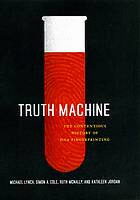
Truth machine : the contentious history of DNA fingerprinting PDF
Preview Truth machine : the contentious history of DNA fingerprinting
Truth Machine Truth Machine The Contentious History of DNA Fingerprinting michael lynch, simon A. cole, ruth mcnally, and kathleen jordan the university of chicago press chicago and london michael lynch is professor in the Department of Science and Technology Studies, Cornell University. simon a. cole is associate professor in the Department of Criminology, Law, and Society, School of Social Ecology, University of California Irvine. ruth mcnally is senior research fellow at the ESRC Centre for Economic and Social Aspects of Genomics (CesaGen), University of Lancaster, England. kathleen jordan earned her PhD in sociology at Boston University, and is now the creative director of a nonprofi t pharmaceutical company. The University of Chicago Press, Chicago 60637 The University of Chicago Press, Ltd., London © 2008 by The University of Chicago All rights reserved. Published 2008 Printed in the United States of America 17 16 15 14 13 12 11 10 09 08 1 2 3 4 5 isbn-13: 978-0-226-49806-5 (cloth) isbn-10: 0-226-49806-9 (cloth) Library of Congress Cataloging-in-Publication Data Truth machine : the contentious history of DNA fi ngerprinting / Michael Lynch . . . [et al.]. p. cm. Includes bibliographical references and index. isbn-13: 978-0-226-49806-5 (cloth : alk. paper) isbn-10: 0-226-49806-9 (cloth : alk. paper) 1. DNA fi ngerprinting—History. i. Lynch, Michael, 1948– ra1057.55.t78 2008 614'.1—dc22 2008001902 The paper used in this publication meets the minimum requirements of the American National Standard for Information Sciences—Permanence of Paper for Printed Library Materials, ansi z39.48-1992. To the memory of Melvin Pollner (1940–2007) Contents Preface ix Acknowledgments xix chapter 1. A Revolution in Forensic Science? 1 interlude a. DNA Profi ling Techniques 24 chapter 2. A Techno-Legal Controversy 39 interlude b. Admissibility, Controversy, and Judicial Metascience 69 chapter 3. Molecular Biology and the Dispersion of Technique 83 chapter 4. Chains of Custody and Administrative Objectivity 113 interlude c. The U.K. National DNA Database 142 chapter 5. Deconstructing Probability in the Case R. v. Deen 155 interlude d. Bayesians, Frequentists, and the DNA Database Search Controversy 183 chapter 6. Science, Common Sense, and DNA Evidence 190 chapter 7. Fixing Controversy, Performing Closure 220 chapter 8. Postclosure 256 interlude e. Fingerprinting and Probability 293 chapter 9. Fingerprinting: An Inversion of Credibility 302 chapter 10. Finality? 335 Cases 347 References 349 Index 379 Preface During the premier season of the immensely popular American tele- vision series CSI: Crime Scene Investigation, the program’s hero Gil Grissom frequently made pithy remarks that conveyed a characteris- tic attitude toward forensic evidence: Grissom (admonishing Warrick Brown, a coinvestigator): Forget about the assumptions. Forget about your promotion. These things will only confuse you. Concentrate on what cannot lie—the evidence. . . . There is no room for subjectivity in this department, Warrick. You know that. We handle each case objectively without presupposition regardless of race, color, creed, or bubble gum fl avor. (Episode 1.01: “Pilot”) Grissom: We’re crime scene analysts. We’re trained to ignore verbal accounts and rely instead on the evidence a scene sets before us. (Episode 1.02: “Cool Change”) Grissom (later in the same episode, to another CSI investigator): People leave us clues, Nick. They speak to us in thousands of different ways. It’s our job to make sure that we’ve heard everything they’ve said. Anything less is reason- able doubt. Grissom (in the same episode): I tend not to believe people. People lie. The evidence doesn’t lie. The ideal investigator personifi ed by Grissom distrusts human testi- mony, and by heroically acting without prejudice, he allows physical evi-
